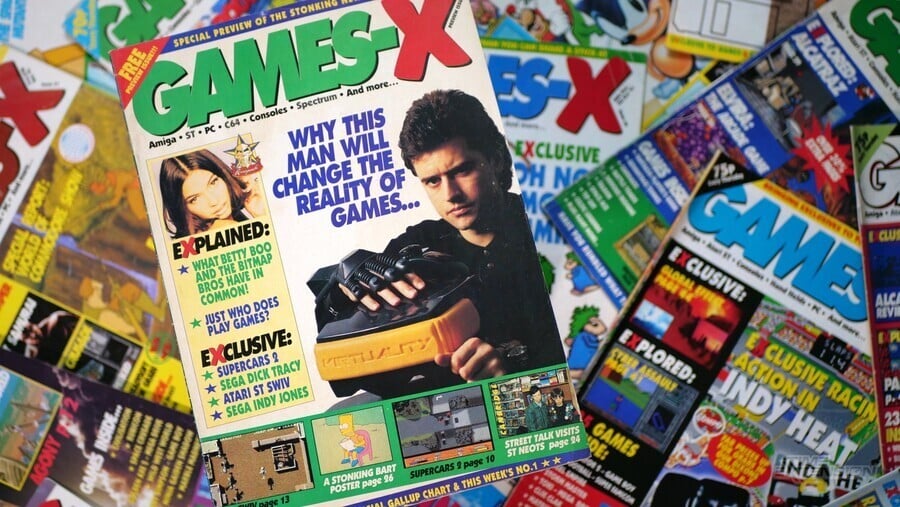
Putting together a monthly video game magazine is no mean feat. You've got pages to fill with insightful copy, print deadlines to meet and a whole host of other concerns to factor in – things which, as games media becomes ever more entrenched in the digital space, are often taken for granted by many. However, it takes a special kind of insane courage to produce a weekly video game publication – and that's exactly what happened with Games-X, the first magazine of its kind in the UK when it launched in May 1991.
Games-X was the brainchild of publisher Hugh Gollner, who, via his Gollner Publishing company, would also create the likes of Amiga Action, ST Action and Mega Drive Advanced Gaming – although he would eventually have to sell his business to Europress as it was always run as something of a loss. Games-X perhaps typifies the company's maverick approach; as Gollner tells The Out of Print Archive, "it was an ambitious magazine. It was also a big mistake – it lost a fortune!"
The magazine would run for 48 issues, with the final one coming in April 1992. According to Gollner, it shouldn't even have lasted that long. "He probably doesn’t know it, but Future [Publishing]'s Greg Ingham was responsible for some of the losses," he tells The Out of Print Archive. "He bet me £100 that the magazine wouldn’t last past Christmas (or some such date) – I was so determined to win his bet that we kept the magazine running far longer than we should. We probably lost £50k more than we should have — and in the end, I never cashed Greg’s cheque – I’ve still got it!"
Despite being something of a commercial bomb, Games-X nonetheless found a receptive audience, and it was unique in that it could offer a more timely delivery of the latest gaming news than its once-a-month rivals. It was also able to call upon some sizeable talent, including Gary Whitta (now famous as the Hollywood screenwriter behind Rogue One: A Star Wars Story), Alex Simmons (IGN Director and UK Studio Lead) and John Davison, who would later move to the US to work for the likes of Ziff Davies, GamePro and CBS, and is currently employed as Vice-President of publishing at IGN, one of the world's biggest media brands.
Keen to know more about the history of this fascinating magazine, we sat down to speak with Davison, alongside fellow Games-X alumni Leslie Bunder.
Time Extension: How did you come to work on Games-X?
John Davison: It was actually kind of an accident. I was taking a gap year before going to university, and I’d interviewed for a staff writer position on ST Action, and I didn’t get it. A short while later I got a call out of the blue saying that they’d like to hire me for something new that they were launching. I was 19 at the time, and I’d been freelancing for an Atari magazine and had a bunch of bylines to my name. Turns out that being previously published did the trick.
Leslie Bunder: I think there was an advert in either Press Gazette or the Guardian Media section some time in late 1990, so I applied, and within a few days I got a phone call asking me to come up for an interview in Adlington, which is near to Manchester. So I went up for an interview, and a few days later they let me know I had the role of features writer on the new publication. So in early 1991, I then moved to nearby Macclesfield and eventually Sale in Cheshire, where I commuted to the office.
As the UK's first weekly games magazine, what were the biggest challenges you faced?
Leslie Bunder: It was really exciting. The biggest challenge was ensuring we always had enough content, from reviews of games through to features and interviews. The publisher (Europress) was used to monthly publications and so had to learn how to manage a weekly, which in itself is a learning process. So it was always a challenge getting enough material to fill the magazine. But we had a lot of great content and also engagement with readers. We used to go out to software stores to get soundbites from their customers on which software they were buying, which made interesting features.
This was a time before big hard drives, before digital capture technology, before PDFs. Everything from getting screenshots to getting the CMYK film to the printer was a big challenge
John Davison: There were a whole bunch of different challenges, but I was such a kid I had absolutely no context for what was “normal” versus what was hard. A lot of the toughest things were just practical considerations for generating a bunch of content about games in a working week. 1991 was a time when production was shifting from old-school methods of putting a print publication together to new desktop publishing. We were building the magazine in an early version of Quark, but the whole process still wasn’t digital. That didn’t come until maybe nine or ten years later. This was a time before big hard drives, before digital capture technology, before PDFs. Everything from getting screenshots to getting the CMYK film to the printer was a big challenge. Because we were weekly, we had to get everything on a very tight routine, and we had to hack together some very creative solutions.
We had some very creative people helping build solutions… from building hardware that could take screenshots of games, to pulling apart Game Boys so we could extract the screen and position it over a light box to photograph the screen under an elaborate hooded rig. Pretty much everything was a hack.
What was the pressure like compared to working on a monthly games magazine?
John Davison: I didn’t really know any better at the time. In hindsight, it was really tough, but honestly, as a foundational part of my career, it was the best thing possible. Once you’ve worked a weekly print deadline, you’re pretty set for anything that comes afterwards. It established a discipline for me that I still have to this day.
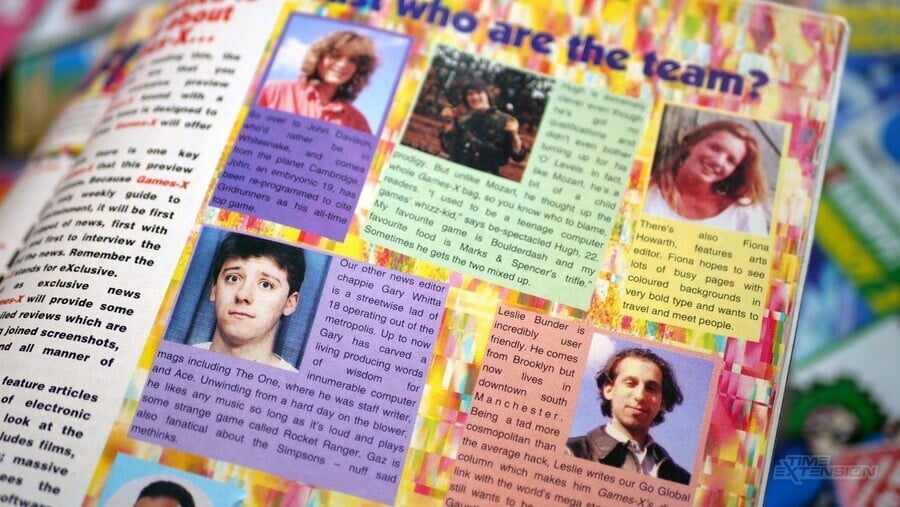
Leslie Bunder: Immense pressure, because you’re constantly up against a weekly deadline, and unlike online publishing, your printing slot at the printers was fixed, which you had to meet. That pressure was felt not just in editorial, but also in advertising.
What's the most memorable anecdote you have of your time on Games-X?
Getting to play Super Mario World, F-Zero, Contra III – games that were so much better looking than anything I’d played before – really set the tone for how exciting the job would be
John Davison: I worked on every issue, including the dummy – so it was a year of my life that was pretty much completely dominated by the work. It was my first time away from home after school, the money was terrible, and I was living a long way from home. What made it special was the people, and the shared love of video games and nerdy stuff. A lot of the people I worked with there have gone on to do some really great things, and back then we just spent so much time together playing games.
My first day on the job was the day the imported Super Famicom arrived from Japan. Getting to play Super Mario World, F-Zero, Contra III – games that were so much better looking than anything I’d played before – really set the tone for how exciting the job would be.
Leslie Bunder: I was really grateful to be able to interview some of the legends of British gaming history. This included jetting on a plane from Manchester Airport to Dundee Airport to interview David Jones, creator/owner of DMA design, who had a massive hit with Lemmings. We drove around Dundee in his fancy sports car. It was really cool to interview and meet people like David, who 30 years later is a real legend with Grand Theft Auto, and to have seen them in those really early days, in Dundee.
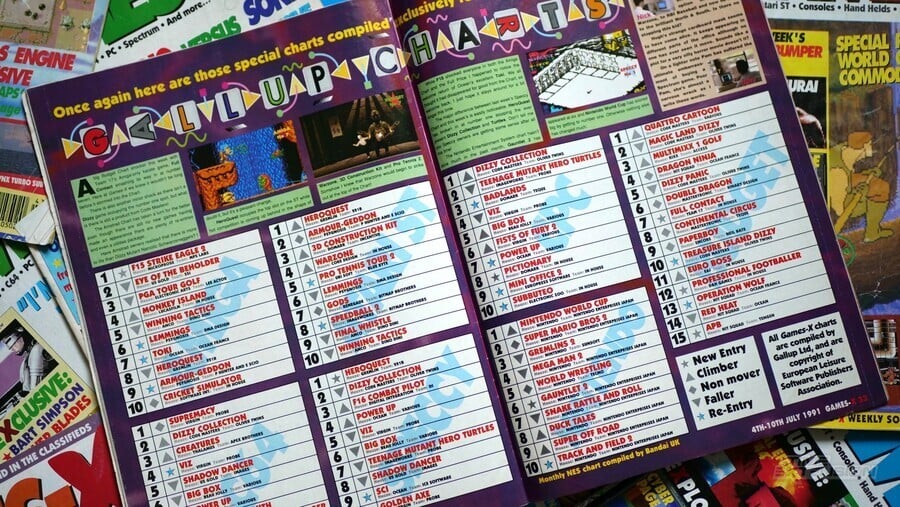
What did you most enjoy about working on the magazine?
John Davison: I was 19 and had somehow managed to turn a hobby into a job. I had zero clue it could become a lifelong thing for me back then, I was just along for the ride. About six months in though, there was one of those big life-changing moments. We were all at someone’s house playing D&D or maybe the Star Wars tabletop or something, and in the car on the way home Colin Stevens (I don’t remember what his job title was, but he was pretty senior) told me that he thought I could really make a career out of this stuff. I’d never really thought about it before, but that vote of confidence from someone that seemed like an actual grown-up really gave me the drive to try and make something of it. Looking back, I think what I enjoyed most was that we crammed so much in, so quickly. It was a crazy time for games – there were so many systems, and so many games – and it just never, ever stopped.
I lived in a horrific dump of a place in Stockport. Fortunately there was plenty to do at work, so I’d just stay at the office until the last bus most nights, just to avoid having to go home
Leslie Bunder: I loved the freedom they gave me as a features writer. As well as doing the main interview each week with a games developer or software company, I was also allowed to have two pages to write about lifestyle/gadget type things called 'Go Global' as well as contributing to other parts of the magazine.
What did you least enjoy about working on the magazine?
Leslie Bunder: We were located in a business park in Adlington, which meant without any public transport it wasn’t the easiest place to get to or get from if you didn’t have a car. You were either reliant on someone dropping you off at the station, or having to get a minicab to get in from there.
John Davison: The work was great. Trying to live on £7,000 a year in the north of England was not easy. I lived in a horrific dump of a place in Stockport. Fortunately there was plenty to do at work, so I’d just stay at the office until the last bus most nights, just to avoid having to go home. It wasn’t a 9-5 job anyway, so it worked out OK.
What was the atmosphere like in the office?
John Davison: It was goofy and silly, but it got stressful every time we were sending pages to the printer. There were always things that were late, and always things that didn’t turn out the way we’d hoped. If I remember right we sent off pages every Tuesday… I think. If that’s right, then Mondays could really suck.
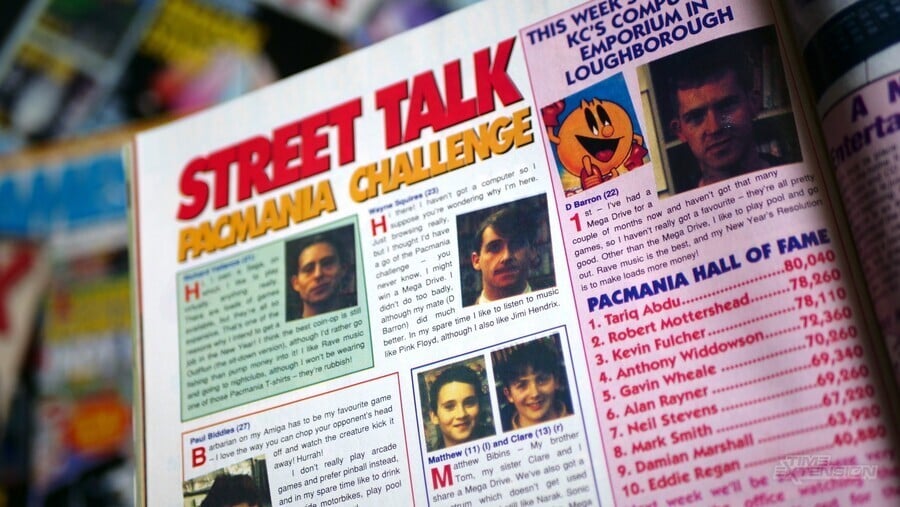
Leslie Bunder: Everyone was really focused and excited by the opportunity which at the time was unique in the games industry, so everyone was buzzed. There was also a lot of marketing and promotion behind the magazine, so you felt the publisher was trying to do something that hadn't really been done before. But as it turned out there was also ongoing tension between the directors about the direction of the magazine and how it should be run.
What was the feedback like from your audience?
John Davison: It was hard to tell. Some of the letters we got were crazy. Remember, there were no comments, no emails, no Tweets. Just letters. We got a lot from people in prison, I recall.
There was also a lot of marketing and promotion behind the magazine, so you felt the publisher was trying to do something that hadn't really been done before
Leslie Bunder: Back in the day, the only way you heard from readers was via snail mail, and we built a great repertoire with readers, from those who sent in hints and tips on playing games, through to those who would take a dislike to us as writers – but the important thing, always, was the readers were passionate when they wrote to us.
What was the highest circulation Games-X achieved?
John Davison: I honestly don’t remember. “Not enough” is probably the right answer.
Leslie Bunder: I don’t recall the circulation figures or the print runs, though talking of print runs it was rather exciting to go down to the printer for the all-nighter for Issue 1, and seeing that coming off the presses.
Why did Games-X close?
Leslie Bunder: Great question. By the time it closed I had already left, as I wanted to move on to one of the publishers’ monthly titles – which for me personally wasn’t a good idea, as I wasn’t really a big fan of writing about the Atari ST. Like all magazines that eventually close, Games-X closed due to a number of reasons, a combination of circulation not hitting what it was promised with advertisers, and not enough revenue coming in to cover its costs and generate a profit.
Perhaps, if the publisher had explored making Games-X into a more lifestyle magazine for gamers it may have attracted more advertisers and grown its reach. But at least Europress tried doing something that hadn't really been done before.
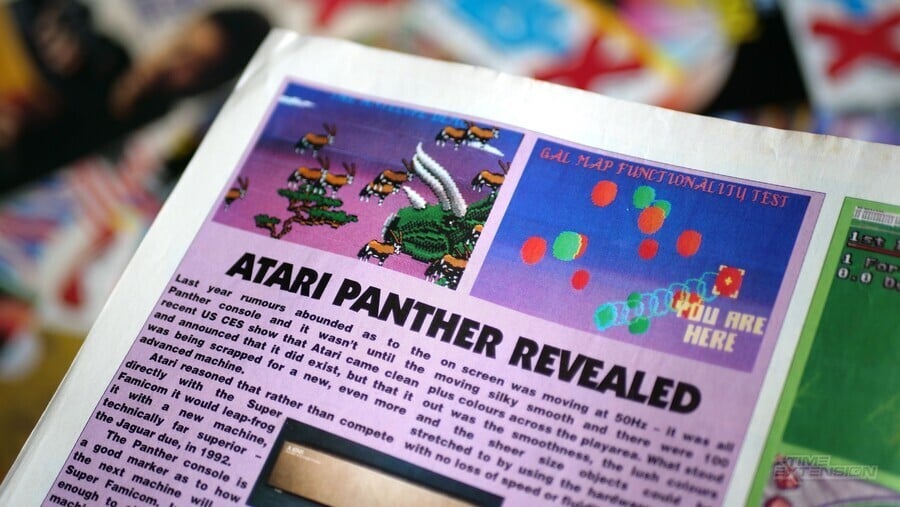
John Davison: I was only a staff writer so wasn’t close to any of these conversations, but if I had to guess it was because it cost too much to make, and didn’t make enough money.
How did you feel when you found out that the mag was closing?
Leslie Bunder: I recall reading about it and by then I had already left. I had thought it may have paved the way for another publisher to set up their own weekly or even fortnightly magazine to fill that gap, but if Games-X wasn't achieving success, then it was unlikely another publisher would be able to do so.
John Davison: I was told I wouldn’t lose my job, which was comforting – but I got bounced around a little. I worked on a couple of issues of GB Action, which wasn’t particularly fun, but I really wanted to work on the SNES magazine that Frank O’Connor was spinning up. It was around that time that Hugh left to start Maverick though, and the majority of the people that worked on Games-X went with him. Me included.
Given that everyone gets their gaming news online now, with stories breaking on an hourly basis, do you think that Games-X was ahead of its time in trying to keep readers more up to date than its rivals?
John Davison: It was, but the logic of launching it in the first place was that fans of games are no different than those of any other kind of entertainment. There was plenty of evidence that more frequent news and reviews about music and movies worked, so it totally made sense. I think we missed a little by leaning a little too hard into the “Smash Hits for games” angle, because it assumed the audience was getting really mainstream, when really the demand was from people that were super hardcore and passionate about games.
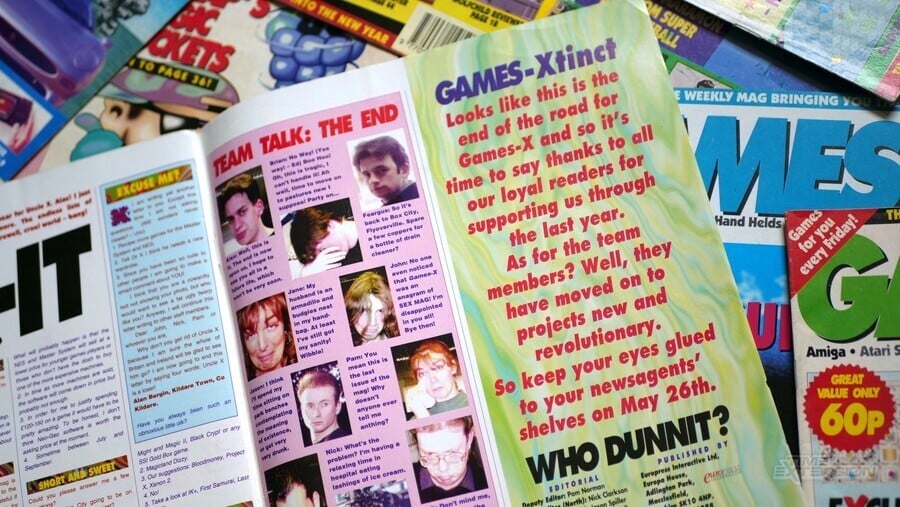
We'd like to thank John and Leslie for taking the time to speak with us.
